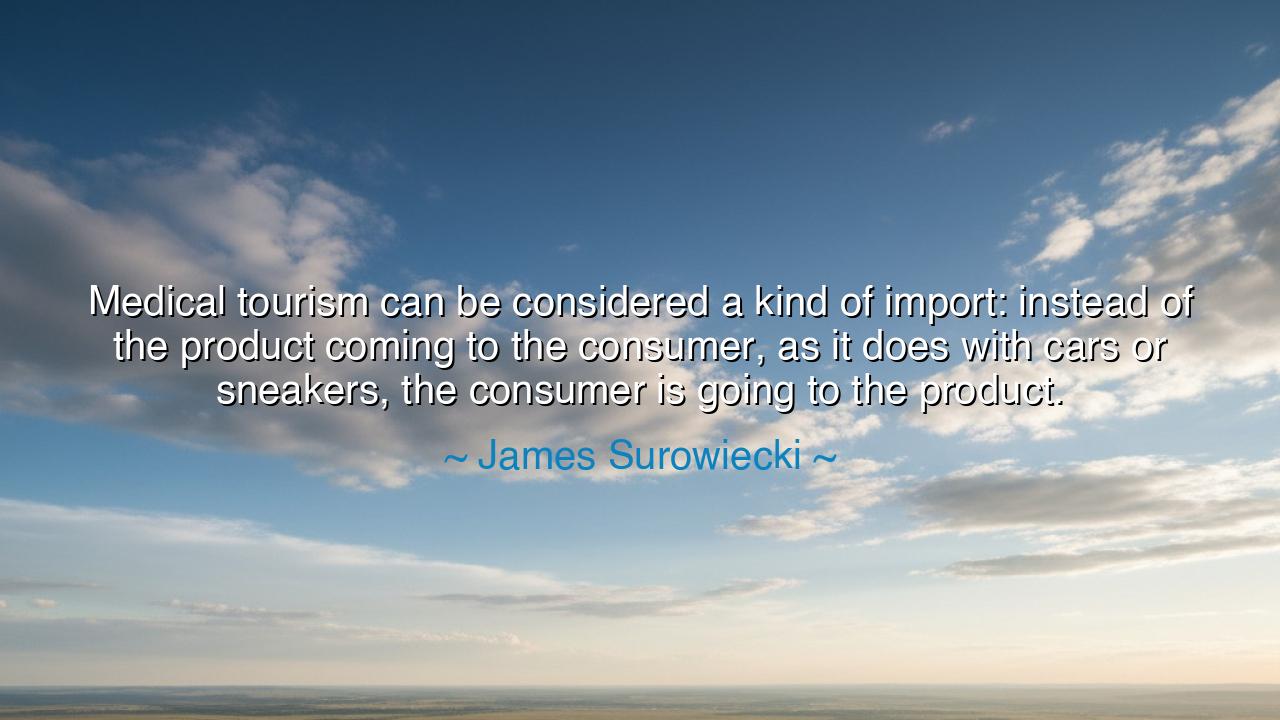
Medical tourism can be considered a kind of import: instead of
Medical tourism can be considered a kind of import: instead of the product coming to the consumer, as it does with cars or sneakers, the consumer is going to the product.






"Medical tourism can be considered a kind of import: instead of the product coming to the consumer, as it does with cars or sneakers, the consumer is going to the product." With these words, James Surowiecki speaks to a new and fascinating dynamic in the world of global commerce, where the movement of people has become as integral to trade as the movement of goods. In this modern age, we see that the flow of not only products but also services, such as healthcare, is reshaping the traditional understanding of trade. The idea that patients are now traveling across borders to seek medical treatments that may be less costly or more specialized than what is available in their home countries is a radical shift in how we view both globalization and the value of healthcare.
In ancient times, the great empires recognized the importance of trade in fostering not only economic prosperity but also cultural exchange. The Silk Road, that vast network of trade routes that connected the East and West, was a conduit not only for silk and spices but for knowledge, medicine, and ideas. Ancient scholars and healers traveled great distances in search of knowledge and remedies, much as medical tourists travel today in search of superior or more affordable care. In Greece, renowned medical practitioners like Hippocrates and Galen were famous not only for their wisdom but also for the way in which their teachings spread across continents, much like the products and services of today’s interconnected world.
What Surowiecki is describing is not merely a new trend in commerce but a return to a very ancient practice. The great healing centers of the ancient world, like those in Egypt and India, drew visitors from across the known world. Medical tourism—the act of traveling for treatment—has long been a part of human history. In ancient India, for instance, people would journey from far and wide to seek out the wisdom of Ayurvedic doctors and the healing practices that have sustained cultures for millennia. Similarly, ancient Romans would travel to the healing waters of Bath in Britain, drawn by the therapeutic benefits of the hot springs. These examples show us that medicine has always had a global reach, with people traveling vast distances in search of healing.
Today, however, the nature of medical tourism has evolved, and as Surowiecki points out, it is no longer the product (the treatment) that travels to the patient but rather the patient who travels to the product. In a world of economic disparity and technological advancement, people are crossing borders in search of more affordable, cutting-edge treatments. Whether it’s for cosmetic surgery in Thailand, dentistry in Mexico, or surgery in India, the consumer has become the traveler, seeking out healthcare that is both high-quality and cost-effective, often at a fraction of the price they would pay in their home country.
The globalization of healthcare is a double-edged sword. On one hand, it allows access to treatments that were once out of reach for many, and in some cases, it fosters the development of new medical specialties and treatments. For example, medical hubs like Singapore and India have become world leaders in cardiac and oncological care, attracting thousands of patients every year. However, on the other hand, it raises concerns about the ethics of healthcare equity, the exploitation of medical workers, and the quality of care. In the ancient world, great healing centers often existed as part of the larger philosophical and moral systems of their time, grounded in the idea of the common good. Today, while medical tourism offers choice, it also raises questions about the commercialization of healthcare and whether it should be viewed as a service like any other commodity, or something more sacred.
One might recall the story of Alexander the Great, whose conquest of vast lands not only spread Greek culture but also brought with it the desire for new medical knowledge. When he and his armies conquered new territories, they sought out the best healers from those regions. For Alexander, medical knowledge was a form of power—something to be acquired, shared, and used for the benefit of his soldiers and empire. His search for medical expertise mirrors the modern-day pursuit of medical tourism—the journey for the best possible care, no matter where it is found. Just as Alexander sought to improve the lives of his people by bringing the best medical practices to them, so too do modern patients seek out the most effective and affordable treatments across the globe.
In the wisdom of the ancients, we find that global movement for healthcare is not a new concept but an ancient one that has evolved with the times. Medical tourism is, in a sense, a return to the age-old practice of seeking the best healing knowledge, regardless of borders. However, this new age of medical travel asks us to reflect on how we value healthcare—not just as a commodity or business, but as a human right. The lesson for us is not simply about seeking better treatment but about ensuring that this pursuit of better health does not exacerbate the inequalities of our time. We must take action to ensure that medical tourism does not perpetuate exploitation, but rather fosters equity and the universal access to the best that humanity’s medical knowledge has to offer. In doing so, we embrace the wisdom of the ancients, who knew that the pursuit of health was as much about compassion and justice as it was about science.






AAdministratorAdministrator
Welcome, honored guests. Please leave a comment, we will respond soon